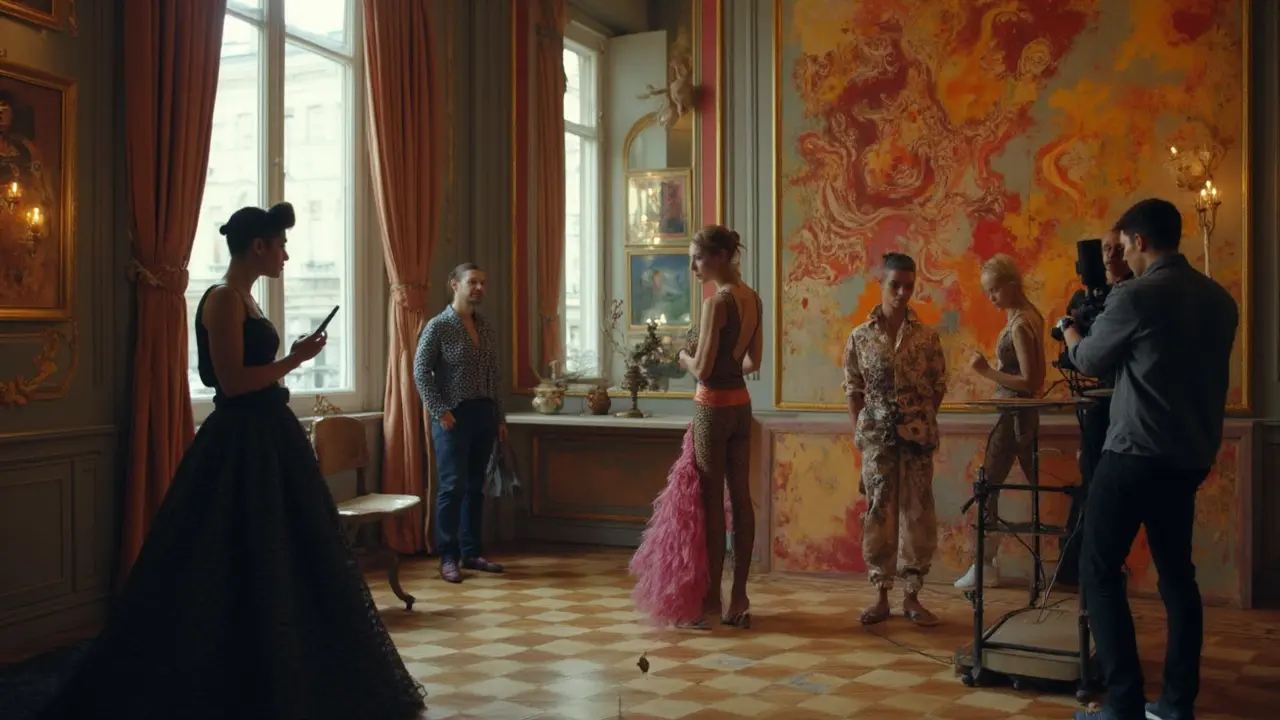People click this topic expecting clarity: do escorts actually shape Paris’s cultural scene, or is that just movie fantasy? Here’s the straight answer. Escorts exist in the same spaces as fashion shows, galleries, luxury hotels, and nightlife-not as a monolith, and not in the way films suggest. Their presence is varied: paid companionship at dinners, discreet plus-ones for events, and, yes, sometimes sex work-each framed by a strict French legal context. If you want stereotypes debunked, the current law explained, and a practical, ethical lens for 2025 Paris, you’re in the right place.
- Paris’s escort economy sits at the edges of fashion, art, hospitality, and nightlife, but not as the center of it.
- In France, selling sex is legal; buying sex has been penalized since 2016, with heavy limits on solicitation and third-party profit.
- Escorting can be companionship-only; sex work is a separate, legally sensitive area with safety and rights issues.
- Media myths blur the reality; the smart approach is harm reduction, consent, and accurate language.
- Event organizers, journalists, and travelers can engage ethically using a few simple checklists.
What “Escort” Means in Paris: History, Myths, Real Work
Paris has always drawn companions-for-hire into its orbit. In the Belle Époque, high-society “courtesans” appeared at salons and opera boxes, woven into the city’s visible glamour. That history colors modern imaginations, but today’s reality is more ordinary and more diverse. An escort might be hired as a plus-one for a design opening, a dinner with clients, or a weekend social calendar. Payment can be for time and social presence, not for sex. Some individuals also sell sexual services. These are overlapping but distinct markets, and conflating them muddies the conversation and the law.
Here’s the myth to dismantle: the “muse of the night” who unlocks art deals or runway seats. Paris culture is professionalized and credentialed-curators, dealers, PR teams, stylists, producers, and hospitality managers run the show. Where escorts appear is usually around the periphery: private tables after a vernissage, hotel lounges during fashion week, or as discreet companions for those who want to look socially anchored in rooms where appearances matter.
Does their presence shape culture? Indirectly. Escorting responds to, rather than creates, Paris’s cultural tempo: packed calendars, social optics, and high-stakes networking. When you see a gracious guest on the arm of a collector at a Paris+ par Art Basel event, you’re seeing the city’s demand for elegance and conversation. The economics follow the calendar: more demand during fashion weeks, design fairs, and major sports or culinary festivals, less in shoulder seasons.
Crucially, this is labor. It involves time discipline, social fluency, language skills (English and French at minimum, plus often Italian, Spanish, or Mandarin), dress codes, and discretion. Clients expect emotional labor: listening, soothing, improvising small talk with strangers. However you feel about the industry, refusing to see it as work blinds you to both risks and rights.
Law and Ethics in 2025: What’s Legal, What Isn’t, And Why It Matters
The current French framework is not a free-for-all. Since 2016 (Law No. 2016-444), the purchase of sexual services is penalized nationwide. Selling sex is not a crime, but clients face fines and may be required to attend educational programs. Pimping and profiting from another person’s prostitution (proxénétisme) remain criminal offenses under the French Penal Code. Public solicitation and certain forms of advertising are restricted. This matters because Paris’s cultural venues-museums, maisons, hotels-operate under policies shaped by national law and brand risk.
| Legal element (France, 2025) | Status | Notes |
|---|---|---|
| Selling sex | Legal (decriminalized seller) | No criminal penalty for the person selling sex. |
| Buying sex | Penalized | Law No. 2016-444; fines (which can escalate) and educational course for offenders. |
| Pimping/third-party profit | Illegal | Criminal offenses under Penal Code (proxénétisme). |
| Public solicitation | Restricted | Street-based solicitation can trigger police action. |
| Advertising sexual services | Restricted/monitored | Platforms face liability; content moderation is common. |
| Companionship-only escorting | Legal in principle | Payment for time/social presence is not itself illegal; lines blur if sexual services are implied. |
| Worker protections | Patchwork | General labor/social protections don’t cleanly apply; NGOs offer harm reduction. |
Ethically, 2025 Paris leans toward harm reduction in public health, while official policy still targets the demand side. NGOs like Médecins du Monde and community groups emphasize free testing, condoms, and nonjudgmental healthcare. STRASS (a French sex workers’ union) advocates decriminalization of clients and stronger labor rights. Amnesty International has publicly supported full decriminalization globally based on risk-reduction logic. Whether you agree or not, the evidence they cite is consistent: criminalizing clients doesn’t erase the market; it pushes it into more hidden, riskier spaces.
For culture workers-galleries, PR houses, hotels-the ethical line is simple: don’t profit from or facilitate illegal acts, don’t endanger people, and don’t glamorize exploitation. Policy-wise, that looks like strict guest-list management, staff training on harassment and consent, and clear “no solicitation” rules on premises. For media and influencers, accuracy beats edginess: clarify whether you’re talking about companionship, sex work, or both, and avoid imagery that romanticizes coercion or poverty.
Where Culture and Companionship Meet: Fashion, Art, Nightlife, Hospitality
When Paris spikes with events, you see more of everything-more art handlers and models, more PR interns and chauffeurs, more private dinners and satellite parties. Escorts in this ecosystem tend to appear where social optics matter and where a guest’s value is measured in vibe and conversation.
- Fashion weeks (women’s, men’s, couture): Escort bookings often cluster around after-shows, PR dinners, and luxury hotel bars where deals are warmed, not signed.
- Art fairs and openings (Paris+ par Art Basel, La Parisienne Photo, Nuit Blanche): You’ll see elegant plus-ones at collector dinners and VIP previews, more often as conversation partners than power brokers.
- High gastronomy and wine: Michelin rooms can be social theaters. A poised companion keeps the evening smooth when language, etiquette, or business sensitivities get tricky.
- Nightlife: Private tables and members’ clubs value presence. The line between a paid companion and a socialite friend can be blurry from a distance, which is why discretion is the unspoken rule.
Visibility varies with seasonality. Spring and fall are heavy-fashion, design, auctions. Summer shifts to hospitality and tourism; winter concentrates around holidays and couture. The 2024 Olympics temporarily rewired the city’s rhythms, with more mainstream hospitality traffic and tighter venue policies; by 2025, the pattern has mostly returned to form, except for heightened security norms and more formalized guest-list checks at high-end venues.
Money talk without voyeurism: rates in companionship markets track two things-time scarcity (calendar spikes) and perceived social capital (language, polish, network). Instagram-era optics also matter: some clients want someone camera-comfortable even if photos never go public. But it’s worth repeating: if sexual services are a factor, the legal risk shifts to the client, and third parties who profit can cross into proxénétisme territory. Cultural venues don’t want that risk.
Three examples without the movie gloss:
- A collector flies in for Paris+ and hates going to dinners alone. He hires a companion known for conversation and art knowledge. They talk Basel, not bedrooms. The value exchanged is social ease.
- A fashion buyer wants a polished table at a buzzy restaurant during couture week. She hires a companion who can bridge multiple languages and keep the energy light with a jet-lagged team.
- An expat entrepreneur attends a charity gala. He brings a companion who knows the local etiquette. No networking shortcuts; just fewer awkward silences.
If those vignettes sound anticlimactic, that’s because real cultural life is anticlimactic: more logistics than romance, more soft skills than scandal.

Reporting, Programming, and Safety: Practical Playbooks for 2025
Different readers have different jobs to get done. Maybe you’re a journalist writing on nightlife, an event producer setting policies, a traveler trying to understand Paris without clichés, or a researcher mapping how informal labor touches the arts. Use these checklists to avoid missteps-and yes, to keep people safer.
Paris escorts get talked about as if they’re mythic. They’re not. They’re workers in a high-image city with a busy calendar. That’s all the frame you need to keep your analysis human and grounded.
For journalists and content creators
- Use precise language: “companionship,” “sex work,” “third-party profit” (proxénétisme) are not interchangeable.
- Quote primary sources on law: Law No. 2016-444, relevant Penal Code articles on pimping. Don’t paraphrase from hearsay.
- Humanize without doxxing: anonymize details, avoid identifying shots, and never publish work venues or logs.
- Balance voices: include worker-led groups (e.g., STRASS) and public health NGOs (e.g., Médecins du Monde), plus legal scholars.
- Avoid glam-core visuals that blur consent or imply minors. You’re not shooting a perfume ad.
- Reality check your claims: verify event access norms with PR teams or venue policies. Don’t fly on myth.
For event organizers, galleries, and hospitality
- Write clear house rules: no solicitation on premises; zero tolerance for harassment; staff escalation paths.
- Train frontline staff: consent basics, discreet de-escalation, and what “proxénétisme risk” looks like.
- Guest-list hygiene: vet plus-ones like any guest. Don’t profile; focus on behavior and policy compliance.
- Health and safety: provide water, visible safe-exit routes, and trained staff for alcohol management.
- No hidden fees: if you run tables or events, transparent charges reduce leverage points for exploitation.
- Data privacy: your RSVPs and CCTV are sensitive. Lock it down; leaks put people at risk.
For travelers and curious locals
- Know the law: buying sex is penalized; third-party profit is criminal. Don’t rely on “but it’s Paris.”
- Respect boundaries: companionship without pressure is one thing; coercion, filming without consent, or doxxing is out of bounds.
- Safety first: look after your friends, arrange transport in advance, and keep conversations free of personal data fishing.
- Be a good guest: dress codes, punctuality, and polite exits go farther in Paris than big talk.
Harm-reduction basics everyone can live with
- Consent is specific, ongoing, and reversible. Alcohol and power gaps complicate it-err on the side of care.
- Health access matters. Encourage nonjudgmental testing and support; don’t shame or out anyone.
- Documentation is power. For workers: keep records of bookings and communications in secure apps; for venues: log incidents without gossip.
Reality checks that cut through noise
- If the story would feel creepy if it were about your sibling, it probably is. Rewrite it.
- Paris’s culture doesn’t need a scandal to be interesting. The calendar is rich enough on its own.
- Discretion is not complicity; it’s often a safety tool. Use it to avoid harm, not to hide crimes.
Mini-FAQ
Are escorts legal in Paris?
“Escort” can mean companionship, which is legal if no illegal acts are involved. Selling sex per se is not a crime in France, but buying sex has been penalized since 2016. Pimping and profiting from someone else’s prostitution are crimes under the Penal Code.
Do escorts influence fashion or art deals?
Directly, not much. They can smooth social situations and optics at dinners or parties. The business side is run by professionals with contracts and NDAs.
Did the 2024 Olympics change anything?
Yes on logistics, not on the core law. Security tightened, venues formalized guest controls, and hospitality got stricter on solicitation. The legal framework from 2016 remains in force in 2025.
How do media tropes get it wrong?
They often blend companionship with sex work and ignore the law. They also glamorize risk and erase worker voices. Use precise terms and cite primary sources.
Is it safe to assume escorting equals trafficking?
No. Trafficking is coercion and a serious crime; consensual adult sex work is not the same. Conflating them hinders anti-trafficking efforts and harms consensual workers. Investigate claims and cite specialized organizations when discussing trafficking.
What are credible sources for the legal context?
Law No. 2016-444 (April 13, 2016), French Penal Code sections on proxénétisme, communications from the Ministry of the Interior, decisions from French courts, and policy briefs from recognized NGOs and academic centers.
Next Steps and Troubleshooting
If you’re a journalist on deadline
- Fact sheet first: pull the 2016 law, a Penal Code summary, and one NGO brief for context.
- Call two voices with different angles (worker-led group and legal scholar) for balance.
- Strip adjectives; keep verbs. Don’t imply what you can’t verify.
If you’re an event organizer planning a VIP-heavy night
- Write and circulate two pages: house rules and escalation protocols. Train the door and the bar.
- Brief security to focus on behavior, not looks. Bias is a brand risk.
- Set a no-photos zone and enforce consent for filming. It helps everyone.
If you’re a researcher or student
- Define your terms: companionship, sex work, proxénétisme. Your literature review depends on it.
- Use mixed methods: venue policy audits, qualitative interviews with anonymization, and legal analysis.
- Don’t scrape personal data. Ethics approvals exist for a reason.
If you’re a traveler trying to “understand the scene”
- Go watch culture, not people: museums, Paris+ fair, public Nuit Blanche installations, neighborhood galleries.
- Treat rumors as rumors. Paris runs on gossip; your judgment doesn’t have to.
- Keep your night simple: plans, transport, and a friend who can call time on the evening.
Red flags and quick fixes
- Red flag: Someone insists “everything is legal here.” Fix: Assume the 2016 law applies and act accordingly.
- Red flag: A venue tolerates aggressive solicitation or harassment. Fix: Leave and report behavior to management.
- Red flag: A story angle glamorizes poverty or danger. Fix: Reframe around agency, policy, and safety.
Paris will always be Paris-elegant, busy, and full of stories. Escorts show up not as secret puppeteers, but as part of the city’s broader service and hospitality web. Treat the subject with precision and care, and you’ll understand both the culture and the people better.

